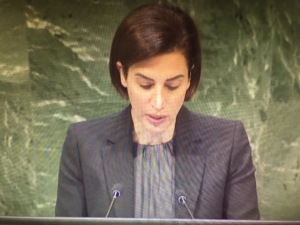 Report of the International Criminal Court at the Plenary Session of the United Nations General Assembly
Report of the International Criminal Court at the Plenary Session of the United Nations General Assembly
United Nations, 29 October 2018
Mr. President,
Let me start by thanking President Eboe-Osuji for his presentation. I wish to make some additional remarks to the statement of the European Union, to which my delegation fully subscribes.
It is Cyprus’s firm belief that the International Criminal Court is an indispensable pillar of he international rules-based order which we have struggled so hard to build over the past few decades, with the United Nations at its core.
The Court stands for every lofty purpose the UN was born to serve:
To ensure that there will be no impunity for the most serious crimes;
To ensure accountability and thus deter the commission of such crimes;
To highlight reparative justice as an essential component of achieving sustainable peace; and
To support the victims.
In order to effectively serve these objectives, the Court needs to have a global mandate. However, as we cοmmemorate the 20th anniversary of the adoption of the Rome Statute and 70 years after Nuremberg, the ICC is not as close to universality as we would like. Universal ratification of the Rome Statute remains the only realistic way of effectively addressing jurisdictional gaps and thereby current challenges and shortcomings, and is crucial to the application of the principle of equality before the law and for the effective deterrence of the most serious crimes under international law. We therefore seize this opportunity to call upon all states not yet parties to ratify the Rome Statute.
Cyprus reiterates its commitment and unfailing support to the Court, a support that has been afforded to the Court since its inception, and to the full cooperation of the Court with the United Nations and with the Member States. We remain committed to the consolidation and reinforcement of international criminal justice, and are pleased that the Court fully recognizes its own responsibility to continuously seek to improve its operations to increase efficiency and effectiveness. We also have full confidence in the impartiality and independence of the Court, which are the cornerstones of the Rome Statute system, and we would like to express our appreciation and support to its exemplary commitment to international criminal justice.
Moreover, we are very pleased that during the reporting period the Republic of Cyprus made its first symbolic contribution to the Trust Fund for the Victims of the ICC. We should never forget that we collectively helped create this Court to provide justice for millions of victims of unimaginable atrocities that deeply shocked humanity. The voice of the victims should never be silenced or forgotten, and the Trust Fund for the Victims does a really commendable work in providing them with assistance and reparations.
Mr. President,
As reflected in the Report, the Court had another very full year in terms of judicial proceedings including investigations, preliminary examinations and institutional developments. The Court continued three trials, pronounced final judgments on two cases before the Appeals Chamber and issued several important decisions on reparations to victims. Furthermore, the Prosecutor is engaged in ongoing investigations relating to 11 situations.
Significantly, this year for the first time on the 6 September 2018, the Court issued a decision on the “Prosecutor’s Request for a Ruling on Jurisdiction under Article 19(3) of the Statute” finding that the Court has jurisdiction with respect to the alleged deportation of a people from a non-State party to the Rome Statue into the territory of a State Party. More specifically, the decision relates to a request from Office of the Prosecutor seeking clarification as to whether it may open a Preliminary Examination in relation to the alleged deportation of the Rohingya people from the Republic of the Union of Myanmar to the People’s Republic of Bangladesh. In so holding, the Court emphasized that “the rationale of its determination as to the Court’s jurisdiction in relation to the crime of deportation may apply to other crimes within the jurisdiction of the Court as well” in circumstances where an element of a crime occurs in the territory of a State Party.
One of the priorities of the foreign policy of the Republic of Cyprus is the prevention of destruction and illicit trafficking of cultural heritage. We therefore recognize the great significance of the Al-Mahdi case, the first case in which the ICC found an individual responsible for the war crime of attacking historic and religious buildings in Timbuktu, Mali and welcome the progress regarding reparations on this case. We also welcome the active engagement of the Court’s Prosecutor in discussions on the responsibility to protect cultural heritage and the signing of a letter of intent between the Prosecutor and the Director General of UNESCO that enhance their cooperation in line with their mandates.
Mr. President,
We are especially pleased with activation of the amendments of the Rome Statute on the crime of aggression, in accordance with the consensus decision reached at the Kampala Review Conference in 2010, thus completing the Rome Statute as originally drafted. The historic significance of the decision to activate the Kampala Amendments cannot be overstated.
Cyprus continues to be among the strongest proponents of the activation of the Court’s jurisdiction over the crime of aggression – the worst form of the illegal use of force – a prospect we awaited for 20 years. We anticipate the application of the law contained in the Kampala amendments by the Court, in exercising its jurisdiction over the crime of aggression, and look forward to the universal acceptance of these amendments in order to ensure that no one will be immune from prosecution for the commission of this supreme international crime.
I thank you for your attention.